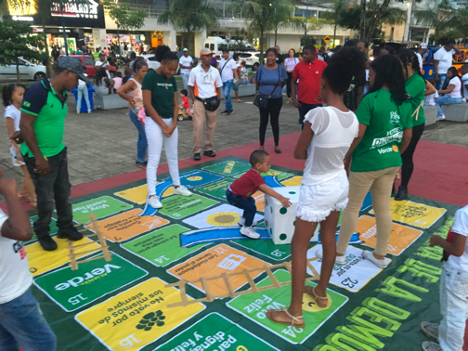Colombia Campaign Fieldwork
Eli Gavin Rau, Ph.D. Candidate, Political Science
I traveled to Colombia from October 10-18, 2019 to follow campaigns for the October 27 elections and to present a working paper for feedback from local scholars. I spent time in Cali, Buenaventura, and Bogotá. This fieldwork trip informs a project on turnout and mobilization strategies in referendums. The related paper (coauthored with Radha Sarkar and Susan Stokes) draws on evidence from the 2016 Colombian referendum and models the different mobilization incentives in referendums versus candidate elections. The primary goal of this fieldwork (conducted with Radha Sarkar) was to learn more about mobilization and campaign strategies in candidate elections. Turnout in Colombia is low across all election types (national elections, municipal elections, and referendums), but municipal elections yield the highest rates of participation.
In Cali, we accompanied Carlos Andrés Arías as to various campaign events. Arías is a city councilman for Cali from the U Party who was running for reelection this year. Arías gave us a tour of his campaign office and introduced us to many members of his team. We observed an extensive operation, with many volunteers working in smaller teams on specific tasks. Many members of his team work on maintaining lists of supporters. They contact the people on these lists regularly to ensure that they will be able to mobilize them for the election. But their contact with these supporters occurs year-round, for all four years of the city council term. They invite their supporters to events throughout the year, and regularly update them on what Arías is doing in the city. Multiple workers said that they make sure they are not always calling their supporters and asking them for something (their vote in an election), but rather maintain a relationship where they are helping their supporters with their problems.
We also accompanied Arías throughout the city as he traveled to various campaign events. He helped to organize many community events, working closely with neighborhood leaders. At one event, a game of bingo was organized for the adults, while children had opportunities to play sports. At another, the campaign provided lunch to all of the attendees. At each event, Arías gave a speech about the upcoming election.

Carlos András Arías, city councilman in Cali, speaks at a local community bingo event.
Our time with the Arías campaign highlighted the decentralization of politics in Colombia and the importance of local politicians in mobilizing voters. The campaign maintained its own lists of supporters, which are not shared with the rest of the party or candidates for higher offices. Instead, he sees himself as commanding votes for higher offices. Additionally, the exchange of favors plays a central role in mobilization. Supporters are loyal to a local leader who solves problems for them, which means their votes do not necessarily transfer to other members of the same party. The general structure of support is highly specific to the individual.
We also accompanied a gubernatorial candidate, Duvalier Sánchez of the Green Party, on a campaign trip in Buenaventura. Duvalier Sánchez was seeking the position of governor of Valle del Cauca. His campaign highlighted very different themes. He expressed opposition to a system in which exchanges of favors dominate politics. His campaign focused on broader structural changes, rather than solving everyday problems.
But in Sánchez’s campaign as well, we observed the decentralization of politics and the weakness of political parties. Within parties, resources and information are often not shared across campaigns, and voters are more loyal to the individual than to his or her party. Moreover, in many cases, a candidate will align him or herself with candidates from another party at different levels of government (e.g., a city councilman may support a gubernatorial candidate from a different party).

Members of Duvalier Sánchez’s campaign team play a game with children in Buenaventura, encouraging civic engagement and discouraging clientelism.
While in Colombia, we also presented a draft of the paper associated with this project and received feedback from scholars in Cali and Bogotá. This feedback, in conjunction with our observations on the campaign trail, generated a clear set of next steps for the project, particularly in the framing and interpretation of the formal model of mobilization strategies. Academics who responded to the paper reiterated some of the major themes we observed on the campaign trail, particularly the decentralization and regional variation in parties, the importance of the individual politician as opposed to party brands, and the ways in which the personalization of campaigns leaves parties and individual politicians with fewer tools for mobilizing around abstract ideas for referendums.